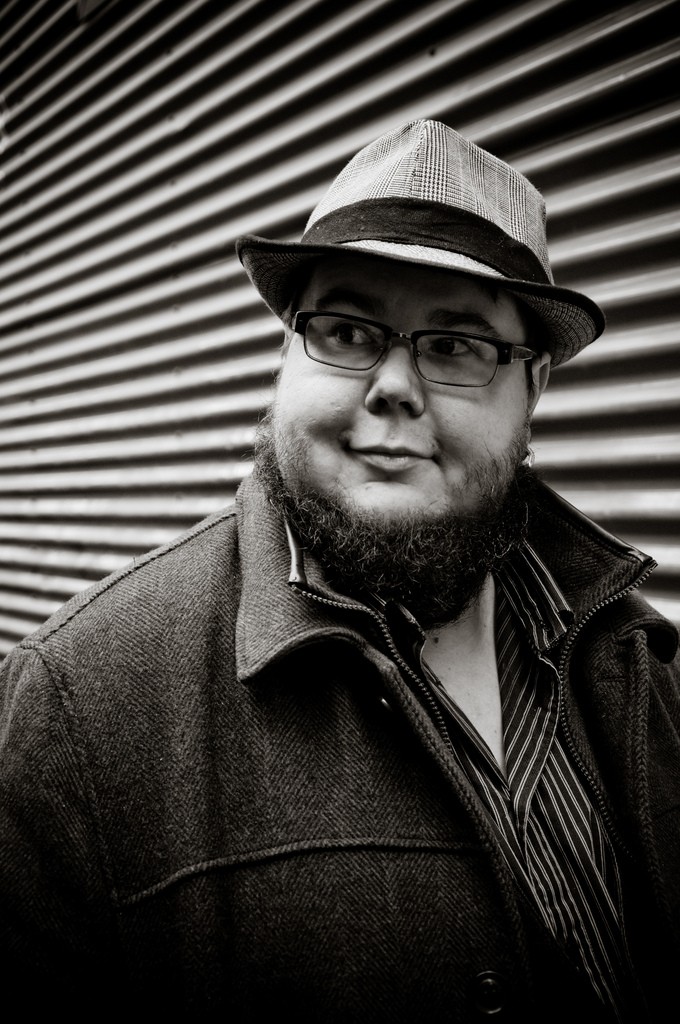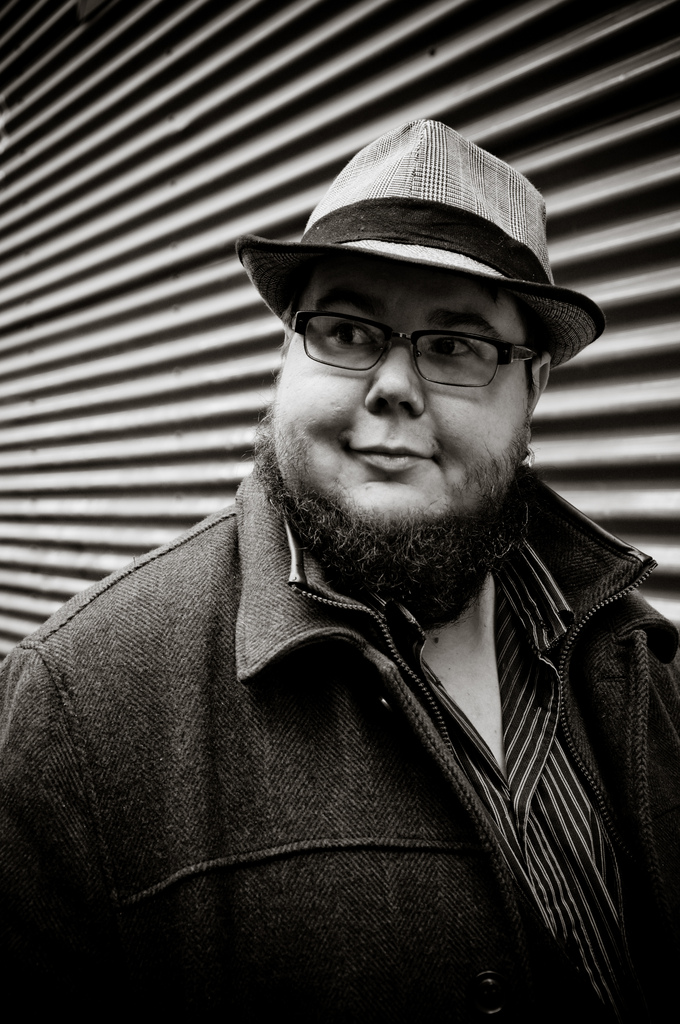
Canadian spoken-word poet Shane Koyczan, known for his melodic rhymes and powerful anti-bullying poems that have found international fame on YouTube, is coming to the Fraser Valley on October 18 for a solo show. Prior to his arrival he spoke with CIVL program director Dave Cusick on his art, his performance at the 2010 Olympics, and his childhood. This interview can be found online at soundcloud.com/dave-cusick/shane-koyczan-interview.
You were raised by your grandparents, is that right?
That’s right, yeah.
Tell me about your grandparents.
My grandad emigrated from Austria and he found work at the mine in Yellowknife, the Con Mine. And so he worked there for a very long time until he retired. And my grandmother worked at a receiving home for abused children and runaways and throwaways and that type of thing. So on the one hand I had a very stern grandfather who worked very hard — well, they both worked very, very hard. But on the other hand, I had a grandmother who was in-touch with her own sort of empathy and really just wanted to help people. And so I felt like I had a pretty good balance of those two worlds growing up. They were very important to me, growing up. My grandmother especially was the one who sort of helped me dealing with all the bullying that I went through at school. There were so many times that I wanted to just quit school and I just never wanted to go back, so she was the one who sort of bolstered my spirits and made sure that I saw it through.
So how did you originally get into poetry in general, as well as performing spoken word?
I always liked writing. I always liked reading. When I first started writing, a lot of it was like the beginnings of really long novels that I never actually got around to finishing. By the time I got to university, my professor was like, “Why don’t you try something that’s smaller, that’s more immediate, that can get you from A to B in a shorter amount of time?” And so that’s when I started dealing with things like short stories and poetry.
In terms of the performing aspect of it, we did some kind of poetry reading with a class for an exercise in university. We had to organize this reading and invite people out to it and it was the first time that I read any of my work publicly. I was surprised immediately by the amount of people that came up to me afterwards and were just like, “Wow, that piece you wrote really spoke to me about this, that, and the other, and I really connected with it.” And I think that’s the first time I ever felt sort of that kind of intellectual acceptance. School had finally ended, that place where I’d been bullied, bullied, bullied; where I just wanted to be left alone.
And now, finally, I was in university, and those attributes that I had were finally being recognized in a positive way. And then I just fell in love with being able to speak my mind because I hadn’t been able to do that for so long, speak my heart for so long. Because growing up it was a lot of “nobody cares what you think or feel,” and finally I was given a space to say something, and realize that people do care what I think and feel because a lot of them think and feel the same thing.
The anti-bullying video that you did do, “To This Day,” definitely resonated with a lot of people. I think it’s at somewhere around 14 million views or something like that. What do you think the reasons are that the bullying was as bad as it was? It seems like it was worse maybe for our generation than it was for previous generations.
I can’t say if it’s worse or not. It’s definitely different. I grew up in an age where there were no posters or any words to bolster our spirits, there were no groups that we could go to, and there was that mentality of like, “Oh, it’s just a part of growing up,” or it’s a part of our evolution or whatever. Now, yeah, it’s a mandate at school where that kind of behaviour is not going to be tolerated. And I think that’s good for us to sort of evolve past that sort of mentality. I mean, why are we doing that to each other in the first place?
But also, now you have more insidious ways to bully people. For us, bullying stopped at 3:30 when the school bell rang, and we got on the buses home, or walked home, or whatever. When we got to the front of our door, when we walked inside of our houses — no matter how bad it was — when you got to your house, bullying ended. Now we live in a world where kids are being bullied inside their own bedrooms on their computer or on their phones. The cyber aspect of what’s happening now is very insidious, and still just as dangerous as what any of us went through physically. Now it’s sort of that more emotional side of things coming into play.
Did it ever come to fists outside for you?
Oh God, yeah. I can’t even recall how many fights I’ve gotten into physically. And it got to a point where at first it was this “blood in the water” sort of mentality, like, “If we hit him, he’s gonna cry!” But after a while, if you get hit often enough, you learn how to take a hit. And then they stop getting that blood from you, and they’ll try to squeeze it from you, they’ll try it again. They’ll figure out different ways to come at you. Then they’ll get into the more emotional attacks.
So there was a wide range of ways I got bullied at school, and I think a lot of people will go through that. Not just at school — it happens in life and the day-to-day, it happens in the workplace all the time. You’re still dealing with a world that’s very stuck in this mentality, and I’m not sure why people insist on doing it. I’m not sure. People say it toughens you up, but I don’t think so. I think it’s more damaging than you’ve possibly considered.
But you’ve found a lot of acceptance. You’ve found an increasingly large audience for your work. I mean, a lot of people hadn’t really heard the type of spoken word and poetry that you do until they heard it from you. At least, the way that I came to know who you was through your performance at the 2010 Olympics. How did that come about, that you were chosen? I don’t think I’ve ever seen a poet at an Olympic opening ceremony before.
Well, I’m sure that when they were first starting off back in Greece it was all poems. Poets and storytellers. So this was kind of a return to that. In terms of how it came about, I’m not actually really sure. They just asked me. They asked me so far in advance, but I felt no pressure committing to it because I thought this was gonna go through a hundred rounds of people saying yea or nay and it’ll probably get cut.
I think it opened people back up to the idea that there’s another way for your voice to be heard.
Poetry for the longest time became that sort of loaded word even in schools, you know. The teacher says “the poetry section” and you hear the collective moan from the students because they’re reading work that doesn’t necessarily speak to them … I get that there are students who read that stuff and they’re like, “I have no idea what this person is talking about” simply because it’s a different time, a completely different generation.
But when you show a generation “Here’s how it’s evolved,” that’s the thing about art. It’s always evolving. It’s always changing. It’s always symbiotically attached to what’s happening around it, and that’s what makes it change, and that’s what makes it strong. And so, when people start to hear a voice that actually makes sense to them, poetry then becomes something like, “Oh yeah, okay, I’m interested in this because this is speaking to me on this level, and perhaps this is a way for me to communicate, as well.”
So you’ve got a show coming up in Mission, at the Clarke Theatre there in just a few days. Is that gonna be with the band, or is that just you on the stage there?
That’s gonna be me solo, and that’s on the 18th.
And that provides you with being able to do different types of pieces as well?
Oh yeah. I mean, I don’t walk into a show being like, “I’m gonna do all love poems right now.” I think that would get a bit tedious for people. Generally for a show I like to take people through a range of emotions. We’ll go to some dark places, but we’ll go to some funny ones, too. I want people to have a full experience.
The problem we have in the world right now is that we’re constantly being told to stuff our emotions into our backpacks while we’re at work or things like that. And, if you have an emotional day at work, they send you home … And so when people come to my show, I like to remind them that it’s okay to have emotions. It’s okay to be emotional about something that’s happened to you. We are emotional creatures, and so that’s the kind of show that I like to put on for people to take them through the range of the possible feelings, to reconnect them to themselves.
This interview has been edited for length and clarity.
Transcribed by Alex Rake.


